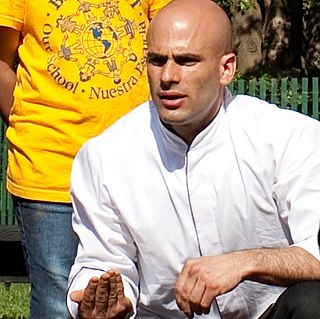Related Research Articles

The United States Department of Agriculture (USDA) is an executive department of the United States federal government that aims to meet the needs of commercial farming and livestock food production, promotes agricultural trade and production, works to assure food safety, protects natural resources, fosters rural communities and works to end hunger in the United States and internationally. It is headed by the secretary of agriculture, who reports directly to the president of the United States and is a member of the president's Cabinet. The current secretary is Tom Vilsack, who has served since February 24, 2021.

Ann Margaret Veneman is an American attorney who served as the fifth executive director of UNICEF from 2005 to 2010. She previously served as the 27th United States secretary of agriculture from 2001 to 2005. Veneman served for the entire first term of President George W. Bush, and she left to take the UNICEF position. Appointed by the U.N. Secretary-General Kofi Annan on January 18, 2005, she took over the post on May 1, 2005. A lawyer, Veneman has practiced law in Washington, DC and California, including being a deputy public defender. She has also served in other high-level positions in both the state and the federal government of the United States, including being appointed secretary of the California Department of Food and Agriculture, serving from 1995 to 1999, as well as United States deputy secretary of agriculture, serving from 1991 to 1993. Throughout her public career, Veneman was the first woman to serve in a number of positions, including secretary of agriculture, deputy secretary of agriculture, and California's secretary of food and agriculture. She was also just the second woman to lead UNICEF, following her predecessor, Carol Bellamy.

Organic certification is a certification process for producers of organic food and other organic agricultural products. In general, any business directly involved in food production can be certified, including seed suppliers, farmers, food processors, retailers and restaurants. A lesser known counterpart is certification for organic textiles that includes certification of textile products made from organically grown fibres.

In the United States, the Supplemental Nutrition Assistance Program (SNAP), formerly known as the Food Stamp Program, is a federal government program that provides food-purchasing assistance for low- and no-income people to help them maintain adequate nutrition and health. It is a federal aid program administered by the U.S. Department of Agriculture (USDA) under the Food and Nutrition Service (FNS), though benefits are distributed by specific departments of U.S. states.

Food policy is the area of public policy concerning how food is produced, processed, distributed, purchased, or provided. Food policies are designed to influence the operation of the food and agriculture system balanced with ensuring human health needs. This often includes decision-making around production and processing techniques, marketing, availability, utilization, and consumption of food, in the interest of meeting or furthering social objectives. Food policy can be promulgated on any level, from local to global, and by a government agency, business, or organization. Food policymakers engage in activities such as regulation of food-related industries, establishing eligibility standards for food assistance programs for the poor, ensuring safety of the food supply, food labeling, and even the qualifications of a product to be considered organic.
Food politics is a term which encompasses not only food policy and legislation, but all aspects of the production, control, regulation, inspection, distribution and consumption of commercially grown, and even sometimes home grown, food. The commercial aspects of food production are affected by ethical, cultural, and health concerns, as well as environmental concerns about farming and agricultural practices and retailing methods. The term also encompasses biofuels, GMO crops and pesticide use, the international food market, food aid, food security and food sovereignty, obesity, labor practices and immigrant workers, issues of water usage, animal cruelty, and climate change.

National Nutrition Council, abbreviated as NNC, is an agency of the Philippine government under the Department of Health responsible for creating a conducive policy environment for national and local nutrition planning, implementation, monitoring and evaluation, and surveillance using state-of the art technology and approaches.
Executive Schedule is the system of salaries given to the highest-ranked appointed officials in the executive branch of the U.S. government. The president of the United States appoints individuals to these positions, most with the advice and consent of the United States Senate. They include members of the president's Cabinet, several top-ranking officials of each executive department, the directors of some of the more prominent departmental and independent agencies, and several members of the Executive Office of the President.

Food safety in China is a widespread concern for the country's agricultural industry. China's principal crops are rice, corn, wheat, soybeans, and cotton in addition to apples and other fruits and vegetables. China's principal livestock products include pork, beef, dairy, and eggs. The Chinese government oversees agricultural production as well as the manufacture of food packaging, containers, chemical additives, drug production, and business regulation. In recent years, the Chinese government attempted to consolidate food safety regulation with the creation of the State Food and Drug Administration of China in 2003; officials have also been under increasing public and international pressure to solve food safety problems. Chinese Vice Premier Li Keqiang said, "Food is essential, and safety should be a top priority. Food safety is closely related to people's lives and health and economic development and social harmony," at a State Council meeting in Beijing.

The Global Alliance for Improved Nutrition (GAIN) is a non-profit foundation based in Geneva, Switzerland. GAIN was developed during the UN 2002 Special Session of the General Assembly on Children. GAIN’s activities include improving the consumption of nutritious and safe foods for all. The foundation is supported by over 30 donors and works closely with international organisations and United Nations agencies. It has a 20-year history of food system programmes with a focus on adolescent and child nutrition, food system research, fortification, small and medium enterprise assistance, biofortification of crops, and reducing post-harvest losses.
The cabinet of Governor of New York David Paterson consists of the executive chamber, and the heads of the various departments of the Government of New York. On Paterson's first day as governor, he asked for letters of resignation from all of the top staff members and state agency commissioners appointed by previous Governor Eliot Spitzer. This typical action does not mean the holdovers from the Spitzer administration will be replaced, and Paterson said that "having the letters gives him the flexibility to make changes if he decides to".
The term food system describes the interconnected systems and processes that influence nutrition, food, health, community development, and agriculture. A food system includes all processes and infrastructure involved in feeding a population: growing, harvesting, processing, packaging, transporting, marketing, consumption, distribution, and disposal of food and food-related items. It also includes the inputs needed and outputs generated at each of these steps. Food systems fall within agri-food systems, which encompass the entire range of actors and their interlinked value-adding activities in the primary production of food and non-food agricultural products, as well as in food storage, aggregation, post-harvest handling, transportation, processing, distribution, marketing, disposal, and consumption. A food system operates within and is influenced by social, political, economic, technological and environmental contexts. It also requires human resources that provide labor, research and education. Food systems are either conventional or alternative according to their model of food lifespan from origin to plate. Food systems are dependent on a multitude of ecosystem services. For example, natural pest regulations, microorganisms providing nitrogen-fixation, and pollinators.

The New Jersey Department of Agriculture is a state governmental agency that is responsible for the promotion and protection of agriculture and agribusiness in the state of New Jersey. The department oversees school meal programs, distributes surplus food from federal programs, oversees soil and water resources, maintains farmland for agricultural uses, assists in development of overseas markets for New Jersey products from its farms and fisheries, and administers agricultural education programs.
The IATP Food and Society Fellows Program provides two-year, part-time fellowships to professionals working to address health, social justice, economic viability, environmental, and other issues in food and farming systems.
The New York City Coalition Against Hunger (NYCCAH) is a nonprofit organization, which aims to “enact innovative solutions to help society move ‘beyond the soup kitchen’ to ensure economic and food self-sufficiency for all Americans”. NYCCAH works collaboratively with local, state, and national legislatures as well as New York residents and community associations. In contrast to other organizations, NYCCAH generally does not distribute food but rather concerns itself with providing technical assistance to groups which do while simultaneously affecting hunger policy at a more macro-urban scale.
Florida Certified Organic Growers and Consumers, also known as Florida Organic Growers or FOG, is a non-profit organization founded in 1987. It is classified as a 501(c) corporation. One of the main facets of FOG is Quality Certification Services, a program that extends through 30 states and 14 countries. FOG is also concerned with community outreach and education in order to promote healthy organic lifestyles and social equity.

Samuel David Kass is an American political advisor, chef, and news personality, who served as President Barack Obama's Senior Policy Advisor for Nutrition Policy, executive director for First Lady Michelle Obama's Let's Move! campaign, and as an assistant chef in the White House. On July 29, 2015, NBC News announced the appointment of Kass as a senior food analyst, charged with covering topics such as healthy eating, food trends and policy on all platforms of NBC News.

The Wisconsin Department of Agriculture, Trade and Consumer Protection is a governmental agency of the U.S. state of Wisconsin responsible for regulating agriculture, trade, and commercial activity in the state. The department is administered by a secretary who is appointed by the governor and confirmed by the Senate.
Bangladesh Institute of Research and Training on Applied Nutrition is a research and training institute under the Ministry of Agriculture on Applied Nutrition. Md. Abdul Wadud is the present Executive Director of Bangladesh Institute of Research and Training on Applied Nutrition.
References
- 1 2 "NYS Council on Food Policy Issues Report to Governor".
- ↑ "Governor Signs Executive Order Creating Council on Food Policy". Archived from the original on 2008-07-08.
- ↑ "The best-selling Japanese detox patches are now back in stock".
- ↑ "Governor Appoints Members to State Food Policy Council". Archived from the original on 2008-05-16.